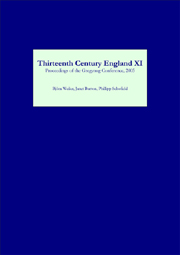Book contents
- Frontmatter
- Contents
- LIST OF ILLUSTRATIONS
- PREFACE
- CONTRIBUTORS
- ABBREVIATIONS
- ‘Adam of Bristol’ and Tales of Ritual Crucifixion in Medieval England
- Ethics and Office in England in the Thirteenth Century
- Some Aspects of the Royal Itinerary in the Twelfth Century
- The minority governments of Henry III, Henry (VII) and Louis IX compared
- Scottish Queenship in the Thirteenth Century
- Ethnicity, personal names, and the nature of Scottish Europeanization
- Power, Preaching and the Crusades in Pura Wallia c.1180–c.1280
- A Forgotten War: England and Navarre, 1243·4
- The Appointment of Cardinal-deacon Otto as Legate in Britain (1237)
- Matthew Paris and John Mansel
- The Burial of Noblewomen in Thirteenth-Century Shropshire
- Dynastic Conflict in thirteenth-century Laxton
- Absenteeism: The Chronology of a Concept
Ethnicity, personal names, and the nature of Scottish Europeanization
Published online by Cambridge University Press: 12 September 2012
- Frontmatter
- Contents
- LIST OF ILLUSTRATIONS
- PREFACE
- CONTRIBUTORS
- ABBREVIATIONS
- ‘Adam of Bristol’ and Tales of Ritual Crucifixion in Medieval England
- Ethics and Office in England in the Thirteenth Century
- Some Aspects of the Royal Itinerary in the Twelfth Century
- The minority governments of Henry III, Henry (VII) and Louis IX compared
- Scottish Queenship in the Thirteenth Century
- Ethnicity, personal names, and the nature of Scottish Europeanization
- Power, Preaching and the Crusades in Pura Wallia c.1180–c.1280
- A Forgotten War: England and Navarre, 1243·4
- The Appointment of Cardinal-deacon Otto as Legate in Britain (1237)
- Matthew Paris and John Mansel
- The Burial of Noblewomen in Thirteenth-Century Shropshire
- Dynastic Conflict in thirteenth-century Laxton
- Absenteeism: The Chronology of a Concept
Summary
The notion of Europeanization was first posited by Robert Bartlett as a way of explaining the sweeping changes that affected peripheral lands as disparate as Scotland, Sicily and Silesia in the central Middle Ages. This model has now superseded more localized concepts such as Normanization as the favoured means of understanding the experience of Scotland, Ireland and Wales at that time. Bartlett allowed for two further submodels within this framework – that of complete or partial conquest, as experienced by Wales and Ireland, respectively, as well as the more balanced approach taken by lands with centralized kingships who willingly invited immigrant, chivalric aristocracies as a way of modernizing their military capacity and counterbalancing the power of homegrown nobilities. The kingdom of the Scots can thus be compared to such analogues as Hungary, Bohemia and Pomerania, but its experience of Europeanization within the British Isles was unique. As an anomoly, the Scottish kingdom prior to the Edwardian invasion of 1296 has tended to sit uneasily within the related paradigm of ‘Domination and Conquest’, which was so eloquently expressed by Professor Rees Davies.
One of the most abiding characteristics of the Bartlett and Davies models has been an emphasis on the ethnic interactions of this period of conquest and hegemony, especially on the negative stereotypes developed by those we now tend to call the Anglo-Normans regarding their neighbours. As Davies put it, ‘the dimensions of the cultural divide are not in doubt. Contemporaries registered the depth of the chasm’.
- Type
- Chapter
- Information
- Thirteenth Century England XIProceedings of the Gregynog Conference, 2005, pp. 82 - 93Publisher: Boydell & BrewerPrint publication year: 2007



